I blow up a balloon - Study guides, Class notes & Summaries
Looking for the best study guides, study notes and summaries about I blow up a balloon? On this page you'll find 549 study documents about I blow up a balloon.
Page 2 out of 549 results
Sort by
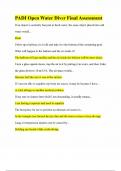
-
PADI Open Water Diver Final Assessment
- Exam (elaborations) • 8 pages • 2024
-
Available in package deal
-
- $15.49
- + learn more
PADI Open Water Diver Final Assessment If an object is neutrally buoyant in fresh water, the same object placed into salt water would... Float I blow up a balloon, tie it off, and take it to the bottom of the swimming pool. What will happen to the balloon and the air inside it? The balloon will get smaller and the air inside the balloon will be more dense I turn a glass upside down, trap the air in it by putting it in water, and then I take the glass down to 10 m/33 ft. The air space would....
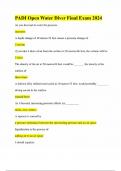
-
PADI Open Water Diver Final Exam 2024
- Exam (elaborations) • 35 pages • 2024
-
Available in package deal
-
- $18.49
- + learn more
PADI Open Water Diver Final Exam 2024 As you descend in water the pressure increases A depth change of 10 meters/33 feet causes a pressure change of 2 bar/ata if you take 6 liters of air from the surface to 20 metres/66 feet, the volume will be 2 liters The density of the air at 20 meters/66 feet would be _______ the density at the surface of three times A balloon fully inflated and sealed at 10 meters/33 feet, would probably ________ during ascent to the surface. expand/burst As I de...
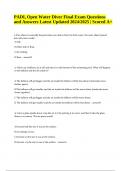
-
PADI Open Water Diver Final Exam Questions and Answers Latest Updated 2024/2025 | Scored A+
- Exam (elaborations) • 22 pages • 2024
- Available in package deal
-
- $14.99
- + learn more
PADI Open Water Diver Final Exam Questions and Answers Latest Updated 2024/2025 | Scored A+. If an object is neutrally buoyant (does not sink or float) in fresh water, the same object placed into salt water would A sink. B either sink or float. C do nothing. D float. - answerD 2) I blow up a balloon, tie it off, and take it to the bottom of the swimming pool. What will happen to the balloon and the air inside it? A The balloon will get bigger and the air inside the balloon will be less d...
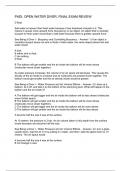
-
PADI, Open Water Diver, Final Exam Review
- Exam (elaborations) • 19 pages • 2023
-
- $12.49
- + learn more
D float. Salt water is heavier than fresh water because it has dissolved minerals in it. This means it causes more upward force (buoyancy) on an object. An object that is neutrally buoyant in fresh water would float in salt water because there is greater upward force. See Being a Diver I - Buoyancy and Controlling Buoyancy. - Answer- 1) If an object is neutrally buoyant (does not sink or float) in fresh water, the same object placed into salt water would A sink. B either sink or float...
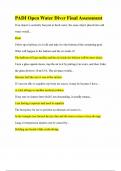
-
PADI Open Water Diver Final Assessment
- Exam (elaborations) • 8 pages • 2024
-
Available in package deal
-
- $14.49
- + learn more
PADI Open Water Diver Final Assessment If an object is neutrally buoyant in fresh water, the same object placed into salt water would... Float I blow up a balloon, tie it off, and take it to the bottom of the swimming pool. What will happen to the balloon and the air inside it? The balloon will get smaller and the air inside the balloon will be more dense I turn a glass upside down, trap the air in it by putting it in water, and then I take the glass down to 10 m/33 ft. The air space would....
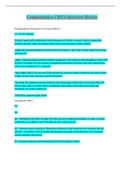
-
Comprehensive CRNA Interview Review Accurate responses are given.
- Presentation • 70 pages • 2023
-
- $18.99
- 3x sold
- + learn more
Comprehensive CRNA Interview Review Accurate responses are given. Comprehensive CRNA Interview Review Norepinephrine Mechanism of Action (MOA) A1, A2, B1 agonist. Primary agent used in distributive shock because it's ability to recruit venous volume and augment preload, while increasing arterial tone, and increasing cardiac output. Alpha one causing peripheral smooth muscle contraction. (low dose venous, high dose venous and arterial). Alpha 2 adrenoreceptor agonism actually ant...
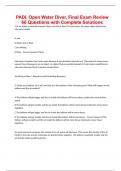
-
PADI, Open Water Diver, Final Exam Review 60 Questions with Complete Solutions
- Exam (elaborations) • 27 pages • 2023
- Available in package deal
-
- $10.49
- + learn more
PADI, Open Water Diver, Final Exam Review 60 Questions with Complete Solutions 1) If an object is neutrally buoyant (does not sink or float) in fresh water, the same object placed into salt water would A sink. B either sink or float. C do nothing. D float. - Correct Answer D float. Salt water is heavier than fresh water because it has dissolved minerals in it. This means it causes more upward force (buoyancy) on an object. An object that is neutrally buoyant in fresh water would float ...
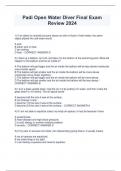
-
Padi Open Water Diver Final Exam Review 2024
- Exam (elaborations) • 13 pages • 2024
-
Available in package deal
-
- $16.49
- + learn more
Padi Open Water Diver Final Exam Review 2024 1) If an object is neutrally buoyant (does not sink or float) in fresh water, the same object placed into salt water would A sink. B either sink or float. C do nothing. D float. - CORRECT ANSWER-D 2) I blow up a balloon, tie it off, and take it to the bottom of the swimming pool. What will happen to the balloon and the air inside it? A The balloon will get bigger and the air inside the balloon will be less dense (molecules move further ...
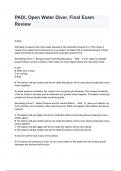
-
PADI, Open Water Diver, Final Exam Review Questions And Answers
- Exam (elaborations) • 20 pages • 2024
- Available in package deal
-
- $13.99
- + learn more
PADI, Open Water Diver, Final Exam Review Questions And Answers D float. Salt water is heavier than fresh water because it has dissolved minerals in it. This means it causes more upward force (buoyancy) on an object. An object that is neutrally buoyant in fresh water would float in salt water because there is greater upward force. See Being a Diver I - Buoyancy and Controlling Buoyancy. - ANS 1) If an object is neutrally buoyant (does not sink or float) in fresh water, the same obj...
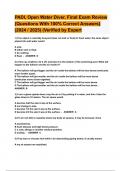
-
PADI, Open Water Diver, Final Exam Review {Questions With 100% Correct Answers} (2024 / 2025) (Verified by Expert
- Exam (elaborations) • 13 pages • 2024
- Available in package deal
-
- $15.49
- + learn more
1) If an object is neutrally buoyant (does not sink or float) in fresh water, the same object placed into salt water would A sink. B either sink or float. C do nothing. D float. - ANSWER D 2) I blow up a balloon, tie it off, and take it to the bottom of the swimming pool. What will happen to the balloon and the air inside it? A The balloon will get bigger and the air inside the balloon will be less dense (molecules move further apart). B The balloon will get smaller and the air i...

How much did you already spend on Stuvia? Imagine there are plenty more of you out there paying for study notes, but this time YOU are the seller. Ka-ching! Discover all about earning on Stuvia


